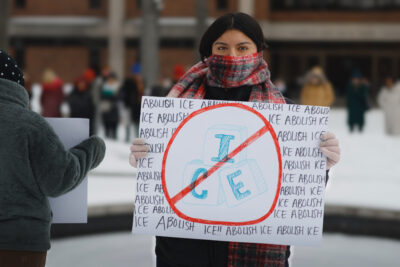The annual interdisciplinary coffee hour left students and staff with individual and collective calls-to-action in regards to climate change.
Ryan Sensenig, associate professor of biological and environmental sciences, tapped a few shoulders of the students who marched in New York earlier this semester, but the details of the event and the arranging of the panel was left to the students.
Cecilia Lapp Stoltzfus, a sophomore and event organizer, said, “We wanted to have ecology, economics, policy, community and international interests represented in this interdisciplinary discussion.”
Members of the panel were the aforementioned Sensenig; Phil Metzler, author at Transition Goshen; Noemi Salvador, sophomore student; Dave Ostergren, director of graduate program in environmental education; and Jerrell Richer, professor of economics.
Sensenig noted the potential paradigm shift of teaching children in elementary schools that plants grow primarily from healthy air, not soil.
Metzler said we are “addicted to convenience,” a privilege he believes we’re not yet ready to let go of.
Salvador outlined the incredible importance of teaching a respect for the earth and for other life forms.
Ostergren challenged those present to “do the impossible” and write to their government representatives.
Richer explained climate change as an ethical issue and moral failure in that our economy allows us to not be held responsible for our negative environmental impact.
Richer said, “If the problem is a lack of responsibility, then we need to have policies that make people responsible.”
Ben Wiebe, first-year and one of the event’s organizers, felt the discussion went well.
Wiebe said, “I loved the range of perspectives and disciplines that were represented and the way that the panelists were able to make us think of climate change and the potential solutions from a variety of different angles and viewpoints.”
From his seat on the panel, Richer appreciated the students’ initiative in organizing the discussion and was pleased with the outcome.
Richer said, “There were more questions than we had time for, and several students followed up with me after the close.”
This hour allowed students and staff to learn from each other about a common issue.
Sensenig said, “It is always inspiring to have individuals from different departments engage in conversation about big challenges – we so desperately need to learn from one another. The thing I enjoyed most was seeing the students’ passion and to hear their wisdom about solutions.”
The discussion doesn’t end here.
Wiebe said, “Now we need to continue the conversation about climate change and keep thinking creatively about ways we can live more sustainably on this planet. Our peers and professors are great resources for us to continue learning and thinking about this.”
Lapp Stoltzfus also provided specific follow-up actions to take.
“We each need to simplify our own lifestyle and reduce personal resource consumption. Beyond that, write your representatives, consider a fossil fuel divestment campaign, and get involved with EcoPAX, Goshen’s Environmental Stewardship Committee, or Transition Goshen. And, keep the conversations going… Climate change affects all of us, regardless of our discipline,” she said.

